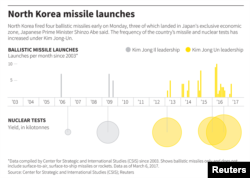The United Nations Security Council is holding a closed-door briefing Wednesday on North Korea's latest ballistic missile launches, as China calls for North Korea, South Korea and the United States to take steps to avoid a "head-on collision."
Ahead of Wednesday's meeting, Chinese Foreign Minister Wang Yi proposed North Korea suspend its nuclear and missile activities, and in exchange the United States and South Korea halt their joint military drills.
Each action has drawn condemnation from the other side, with Wang describing them as "accelerating trains, coming toward each other with neither side willing to give way."
UN condemns test
The Security Council strongly condemned the North Korean tests on Tuesday and gave its own warning for the potential of a regional arms race.
The council statement further expressed regret that the government is "diverting resources to the pursuit of ballistic missiles while Democratic People's Republic of Korea citizens have great unmet needs."
North Korea fired four ballistic missiles into the sea off Japan's northwest coast on Monday, which coincided with the start of joint U.S. and South Korean annual defense exercises in South Korean territory.
The launches prompted U.S. President Donald Trump to reaffirm what the White House called the "ironclad commitment" of the United States to stand with Japan and South Korea in the face of Pyongyang's repeated violations of U.N. resolutions.
North Korea conducted two unauthorized nuclear test explosions last year and nearly two dozen rocket launches in a continuing push to expand its nuclear weapons and missile programs.
North Korean leader Kim Jong Un declared in a speech on New Year's Day that his country's program to build inter-continental ballistic missiles had "reached its final stage."
North Korea has been under U.N. sanctions since 2006, along with an arms embargo aimed at slowing the development of its banned nuclear and missile programs.
Since then, the United States and a vast majority of world governments have repeatedly demanded that the North denuclearize the Korean peninsula. However, Western leaders have yet to devise a plan that would either compel the North to cooperate or create incentives for it to do so.
China-sponsored talks between North Korea and a six-nation panel have been stalled since 2009, when the communist North pulled out of the negotiations. The North had carried out its first underground nuclear test explosion three years before the talks broke down.
The United States has since said the six-party talks could not resume until Kim's regime in Pyongyang would recommit itself to halting all nuclear tests and scrapping its nuclear development program. That policy was agreed to during the administration of former President Barack Obama, and President Trump's government has reaffirmed it.






